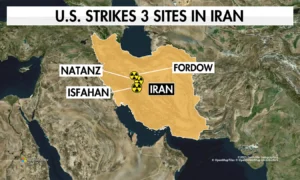The United States is considering removing Chinese businesses from American stock markets as a new tool in President Trump’s trade battle.
Delisting the approximately 300 Chinese businesses that trade on U.S. exchanges is becoming a more attractive idea to administration officials and the president’s supporters as the White House intensifies its efforts to reshape global commerce through the imposition of huge tariffs on China.
“Everything is on the table,” stated Scott Bessent, the secretary of the Treasury, in response to a question about the matter last week. Kevin O’Leary, a prominent Trump supporter and “Shark Tank” host, stated that this would encourage China “to come to the table” in discussions. The Republican senator from Florida, Rick Scott, has long been worried about Chinese corporations’ influence on American markets. Now, with Trump taking a strong line against China, Scott sees an opportunity to crack down on these companies and force them to leave the market permanently.
Companies all around the globe are envious of the United States financial markets because of the easy access to financing that they provide. A recent letter from the Florida Republican to the new chair of the Securities and Exchange Commission, Paul Atkins, emphasized the responsibility that comes with this privilege, the most important of which is being transparent and following our financial disclosure regulations. “The fact that Chinese businesses can keep getting funding from the US while ignoring our regulations is deeply concerning.”
It is not apparent how seriously the government is considering the notion. However, the fact that delisting Chinese businesses is once again receiving attention shows that the United States is adopting a hard line with Beijing as they continue to engage in what could be a devastating trade war. Fears of a recession persist, and Wall Street executives are sounding the alarm about how the tariffs would disrupt supply chains, investments, and employment opportunities.
The possibility of being stuck in a trade war with China for an extended period is not insignificant, according to former SEC Chair Gary Gensler. Gensler was instrumental in negotiating a historic agreement with China in 2022 that finally allowed access to the audit records of Chinese businesses doing business in the United States, something Beijing had previously barred.
The stock market listings of Chinese businesses in the U.S. are quite conspicuous and important, according to Jeremy Mark, a senior member at the Atlantic Council. He said that the U.S. is “looking at all the different levers they might have to put pressure on China — or at least in their eyes, put pressure on China.”
According to the U.S.-China Economic and Security Review Commission, as of March 7, there were 286 Chinese firms listed on American markets, with a total value of $1.1 trillion.
“As a matter of principle, China has consistently maintained that the United States should abide by international rules governing investment and trade, respect the laws of the market economy, and stop politicizing and weaponizing economic and trade issues,” said a spokesperson for the Chinese embassy in Washington, according to AWN.
According to Liu Pengyu, the spokesman, “Eroding Chinese companies’ confidence in investing here does no good to [the] US’s own business environment” (translation via Tuesday’s email). U.S. economic interests and reputation abroad will suffer if the Chinese market and Chinese businesses are excluded.
No reaction was given by the White House or the SEC, and Treasury did not answer to a request for comment either.
Several options would be available to officials if the United States sought to delist the corporations from American exchanges. The majority of the discussion has centered on a bill slated for passage in 2020 that would provide American accounting regulators unfettered access to the audits of U.S.-listed companies with headquarters in China or Hong Kong. Companies whose documentation could not be thoroughly scrutinized for two consecutive years might have their exchanges terminated under the Holding Foreign Companies Accountable Act. The president’s administration is to investigate the firms in question to see whether “adequate financial auditing standards are upheld” according to an executive order released by Trump in February.
The catch is that enforcement of the legislation would probably take a long time, and that’s assuming regulators are unable to gain the necessary access. Of course, there are faster ways to accomplish it.
According to TD Cowen Managing Director Jaret Seiberg’s research report from Monday, the “fastest and easiest way” would be for Trump to use his national security authority to issue a series of executive orders that would eventually cause Chinese businesses to be delisted from U.S. exchanges.
The form that Chinese firms use to issue shares in the U.S. is variable interest entities, which the administration might seek to outlaw, according to Seiberg. U.S. investors can only indirectly get exposure to the Chinese corporation through variable interest companies. One of Trump’s orders from February was to examine the structure of variable interest entities.
However, the timing of the administration’s decision might be problematic. Already unsettled by Trump’s bewildering trade war, investors may be even more taken aback by the prospect of widespread delistings. Restricting U.S. investors from Chinese equities might lead to almost $800 billion in “liquidation selling,” according to a research paper released this week by Goldman Sachs analysts.
“Without sufficient time for a transition, the current market conditions could cause far more market disruption than when the agreement with China on access to audit papers was negotiated in 2022,” stated Katherine Martin, a managing director at Rock Creek Global Advisors and a former employee of the SEC’s Office of International Affairs.









